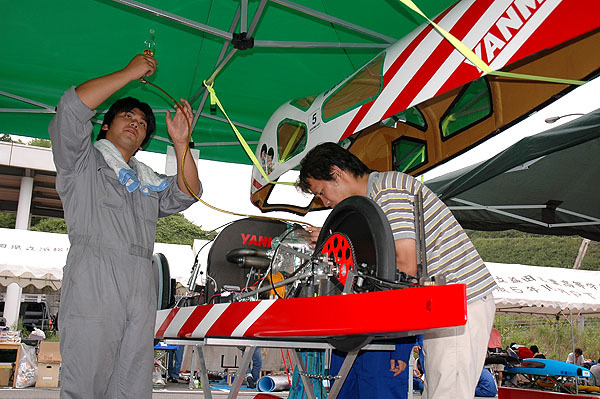Biodiesel use in competition, and in getting to the track



Photo: Peck Motorsports
July 12, 2012
BY Ron Kotrba
What does a U.S.-based NASCAR hauler with solar panels have in common with a championship vehicle developed by a Japanese team attempting to break a world record in Kuala Lumpur? Both vehicles, the hauler and an eco-marathon winner on opposite sides of the globe, are fueled with biodiesel.
At the Shell Eco-Marathon Asia in early July a team from Hyogo Prefectural Tajima Technical Institute’s Automobile Engineering Club, led by Toshinari Fujii, won the Alternative Diesel Fuel Award by achieving an astounding 1,186.6 kilometers per liter (2,791 miles per gallon) running on biodiesel, surpassing on-track competitors in the same field by nearly 10 times the fuel efficiency.
Not only does the vehicle achieve stellar fuel mileage, making it highly fuel-efficient, but by running on biodiesel, the little fuel that it does burn in combustion has major greenhouse gas life-cycle emissions reductions compared to petroleum diesel.
Halfway around the world, Todd Peck, a race car driver making his debut in the NASCAR Camping World Truck Series, is holding an autograph session and photo opportunity July 12 at a Love’s Travel Stop in Newton, Iowa, as he fills up his solar-powered race car hauler on a 15 percent blend of biodiesel.
Advertisement
Racing since he was 14, the now 26-year-old driver, who has arthritis and is partnered with the Arthritis Foundation, will be behind the wheel of the No. 96 Stopain Cold truck July 14 at the Iowa Speedway in Newton, where the American Ethanol 200 race is taking place. Peck is based out of Pennsylvania and is partnered with instate biodiesel producer Keystone Biofuels.
In between radio interviews and the late afternoon event at Love’s Travel Stop, Peck spoke with Biodiesel Magazine about the hauler and its use of biodiesel.
He said the short-term goal is to run the Cummins-powered big rig on B50. “But our long-term goal is to use 100 percent biodiesel,” he said.
Advertisement
Other than switching out some fuel line components and keeping extra filters on hand, Peck said the team is gradually increasing the biodiesel content as the solvent-like nature of biodiesel helps clean away deposits left by mineral diesel.
The large trailer-style hauler doubles as a garage where the trucks can be worked on. With help from partner Renewable Engineered Systems, the hauler was outfitted with a Survivor Power System 1200, the latest mobile power production utilizing Global Solar Power Flex technology, which powers the Finish Line LED lights and equipment inside.
Most equipment and lighting inside other NASCAR haulers are powered by a diesel generator. “They log some [serious] hours on those generators,” Peck said. “It’s the first thing that fires up when they get to the track, and it’s the last thing that shuts down when they leave.”
Peck said Keystone Biofuels Owner and President Ben Wootton has helped Peck Motorsports map out where the team can fill up on biodiesel as it moves from race to race.
“We’re really excited about it,” Peck said. “NASCAR’s not typically viewed as a green sport, so everything we can do to go green, we’re doing—bigger, better and beyond.”
Upcoming Events





